Solar power has revolutionized the renewable energy landscape, but emerging technologies like solar power from hydrogen gas take this transformation a step further. Hydrogen gas, known for its ability to store energy, is now being explored as a way to enhance solar efficiency. This revolutionary process converts sunlight into electricity while using hydrogen as an energy carrier. While hydrogen gas isn’t the primary focus when discussing solar panel efficiency or coatings, it helps understand the broader context of technological innovations in renewable energy.
Just as hydrogen gas brings a leap forward in energy storage, anti-reflective coatings play a crucial role in maximizing the efficiency of solar panels. Both aim to optimize how we harness the sun’s energy, ensuring maximum output with minimal waste.
How Anti-Reflective Coating Enhances Solar Panels
The Science Behind Anti-Reflective Coatings
When sunlight hits a solar panel, some of it reflects off the surface, resulting in energy loss. Anti-reflective coatings (ARCs) are designed to minimize this reflection, allowing more light to be absorbed by the solar cells. By enhancing light absorption, these coatings improve the panel’s overall efficiency, significantly increasing the solar panel energy output.
In fact, research indicates that panels treated with ARCs can absorb up to 99% of sunlight, compared to untreated panels, which only absorb around 90%. This difference in absorption can lead to a noticeable increase in energy output, making solar installations more productive and cost-efficient.
How ARCs Impact Solar Services and Solar Panel Preparation
Proper preparation of solar panels is critical for effective ARC application. Panels need to be clean, free of dust, and properly aligned to receive the full benefit of the coating. This ensures that the coating can bond well to the panel’s surface, reducing the potential for damage and maintaining long-term effectiveness.
In commercial solar services, installing and maintaining anti-reflective coatings is often part of the maintenance plan. Solar energy companies, especially those offering solar services, consider ARCs essential for boosting the longevity and efficiency of solar panel systems.
Personal Experience with Anti-Reflective Coating
During the installation of my home solar panel system, I was advised by my installer to opt for panels with anti-reflective coatings. Initially skeptical, I agreed to the recommendation after researching its benefits. After just six months, I noticed a significant increase in the energy output of my system, allowing me to generate enough electricity to offset a considerable portion of my household’s energy needs.
This experience showed me firsthand the value of ARCs in maximizing solar panel performance. The improved efficiency helped me save money, and the knowledge that my system was optimized to absorb as much sunlight as possible provided peace of mind.
Key Benefits of Anti-Reflective Coating in Solar Panels
Boosting Energy Output
Solar panels treated with ARCs can absorb more sunlight, which translates into higher electricity production. When considering energy output over time, this can result in a significant increase in the overall energy generated by a solar system.
Increasing Panel Lifespan
Anti-reflective coatings also help protect solar panels from environmental damage. By shielding the panels from dust, dirt, and other debris, ARCs contribute to longer panel life and reduce the need for frequent maintenance or replacement.
Lowering Installation Costs
While anti-reflective coatings may increase the initial cost of a solar panel system, the long-term benefits, such as higher energy output and reduced maintenance, often lead to lower costs over time. The additional energy produced can also shorten the payback period for the system, making solar power a more attractive investment.
Commercial Applications: Solar Panels and Anti-Reflective Coating
One company, Znshine Solar, integrates anti-reflective coatings into their commercial solar panels. Their high-performance panels are designed to meet the demands of large-scale solar installations while providing superior light absorption. These panels, equipped with advanced ARCs, are particularly effective in regions with less sunlight, as they maximize the amount of light captured.
Znshine’s use of ARCs represents the industry’s growing commitment to innovation and efficiency in solar energy production. For large installations, whether on commercial rooftops or solar farms, ARCs are a game-changer in maximizing energy generation.
Solar Efficiency
While anti-reflective coatings optimize light absorption, inverters like the 3-Phase Hybrid Inverter convert that energy into usable electricity. This inverter is crucial in managing power output, especially for larger installations. The combination of ARCs and high-quality inverters can dramatically improve the overall performance of a solar energy system
Summary
This guide highlights the importance of anti-reflective coatings (ARCs) in improving solar panel efficiency by reducing light reflection and boosting energy output. It covers how ARCs protect panels from environmental damage, increasing their lifespan and making solar energy more cost-effective. The post also incorporates real-world examples and emphasizes the commercial benefits of ARCs in solar systems.
.
FAQs About Anti-Reflective Coating in Solar Panels
1. How does anti-reflective coating improve solar panel efficiency?
Anti-reflective coatings reduce the reflection of sunlight, allowing more light to be absorbed by the solar cells, which increases energy output.
2. Are anti-reflective coatings necessary for all solar panels?
While not necessary, ARCs can significantly enhance the performance of solar panels by boosting energy absorption and overall efficiency.
3. Do anti-reflective coatings affect the lifespan of solar panels?
Yes, ARCs can help extend the lifespan of solar panels by protecting them from environmental damage like dust, dirt, and debris.
4. How often should anti-reflective coatings be reapplied?
Most ARCs are designed to last the lifetime of the solar panel, so they do not need to be reapplied frequently. However, proper maintenance is essential to ensure long-term effectiveness.
5. Can I add anti-reflective coatings to existing solar panels?
Yes, anti-reflective coatings can be applied to existing panels, though it’s recommended to consult a professional for proper installation and maintenance.








